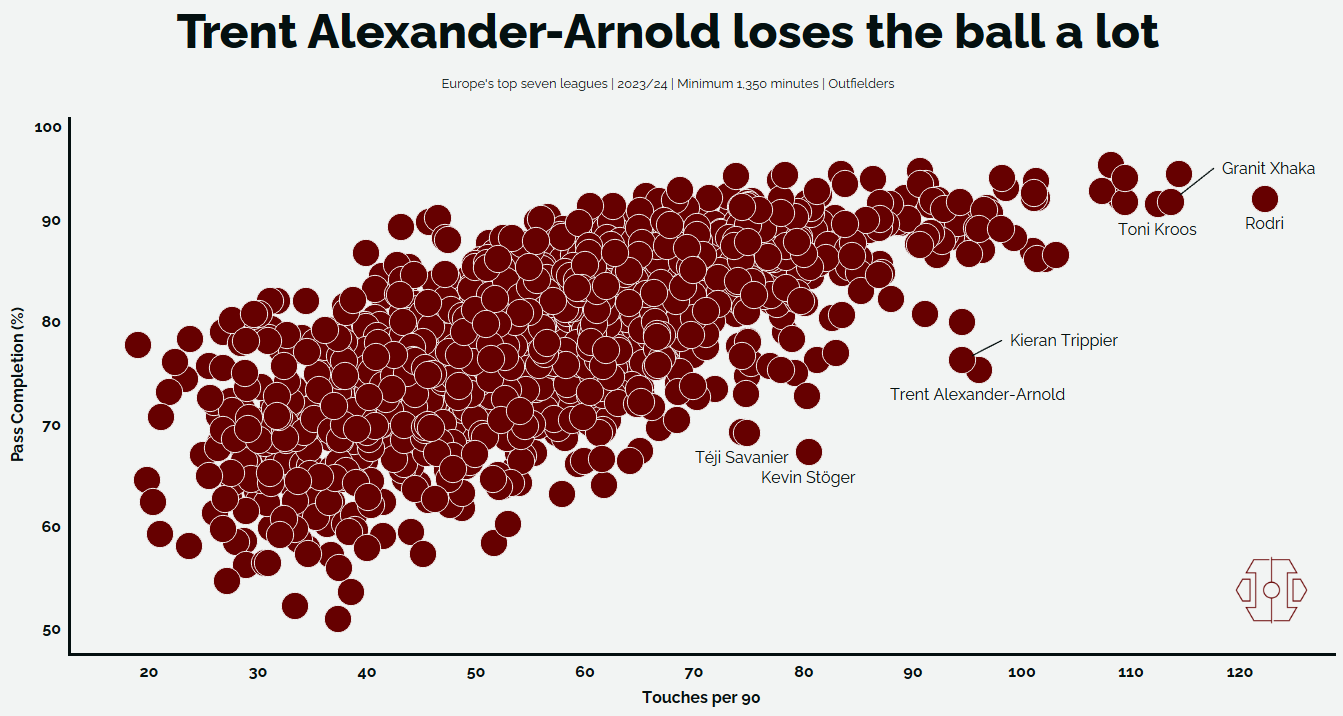What Is a Trent Alexander-Arnold?
Jürgen Klopp, Gareth Southgate and Arne Slot are all still figuring out how to use Trent Alexander-Arnold.
So first on the agenda, England are terrible. I’ve generally backed Gareth Southgate for most of his tenure. I don’t think he’s that good — especially when it comes to mid-game management — but he’s done some positive things over the years.
His impact on the culture and noise surrounding the national team has been massive, and aside from that, he’s also been the only England manager in my lifetime who has prioritised the system ahead of the individuals.
In previous tournaments, he’s made big calls on players like Trent Alexander-Arnold because despite the Reds talisman being incredible, he hasn’t been the right fit for his system. Liverpool supporters have criticised Southgate for his moves, but putting the collective first is absolutely the right thing to do.
I grew up watching every England boss use Steven Gerrard and Frank Lampard in a 4-4-2 formation. The players didn’t matter. It was just 4-4-2 every single time, and no silverware followed. England have always been painful in a tactical sense.
Southgate has mostly challenged that dynamic but this time around, he’s sold his soul by picking all of his best individuals and hoping they just manage to figure it out. Remember my Profiles and Puzzles piece last month? Yeah, that.
England have no balance at all, it has been very ugly so far. A back four full of right-footed defenders, a right-back trying to be a midfielder in Alexander-Arnold, two wide forwards who are both lefties and like to receive the ball to feet in Bukayo Saka and Phil Foden, and a striker who can’t run in behind in Harry Kane.
Everybody is looking for an individual to blame, but this has been a collective issue so far, meaning the manager deserves the criticism. If nobody looks good, it’s probably not the fault of one single ingredient. You need to look at the guy who is cooking the meal.
Alexander-Arnold is a bit of a scapegoat for the national team right now, but despite Southgate’s schoolboy errors, the local wonderkid is still very much a weird one to solve on Merseyside.
He’s 25 years old now. He’s won everything in the sport, he’s one of the most talented players of his generation, and he’s the vice-captain of arguably the biggest club in England. Despite that, though, nobody quite seems to know what he is at the moment.
So right now — for about the next five minutes or so — I want you to forget everything you know about Alexander-Arnold’s positional history. Maybe we’ll benefit from viewing him as a blank slate.
Let’s focus on his key strengths. If you was in charge of him, what exactly would you be looking to maximise? Well, there’s an easy answer to this. Our man is a joke when it comes to being extraordinary on the ball.
His passing range knows no bounds. His crossing is brilliant. His switches are serene. His ability to spot openings by creating chances is excellent, and his ability to progress the ball from deeper areas is great, too.
So you want to present him with a platform to try things. You don’t want to put shackles on this guy. He’s going to benefit from an element of creative freedom, albeit not too much because the dreaded ‘free role’ never actually works.
However, although he’s really inventive on the ball, he loses it a lot. His desire to play the decisive pass can spill over. In fact, of the 17,521 passes he’s attempted in the Premier League since his debut, only 12,910 have found a red shirt.
So in essence, Alexander-Arnold is a player who — when in possession — passes to an opponent 26.3 per cent of the time. You really need to accommodate that, because it makes him pretty unique, as shown below.
He’s unusual in the sense that he gets lots of touches for his team, but loses the ball far more often than your typical controlling presence, like Toni Kroos or Rodri.
I appeared on The Anfield Wrap last week and talked about his use of possession. Our number 66 has no chill. No filter. It’s all about the risk, who cares about the reward?
Players who lose the ball as much as Alexander-Arnold does tend to play in the final third, because if they do lose possession up there, it shouldn’t hurt the team that much.
Last season, for example, only three players in Liverpool’s squad lost the ball more often than Alexander-Arnold. The trio in question? Mohamed Salah, Diogo Jota and Darwin Núñez. Imagine playing one of them as a right-back, or as a number six.
So now, we can have a think about his negatives. If you was in charge of him, what exactly would you be looking to mask? Well, his tendency to lose the ball is definitely one of them, as shown above.
He’s also not quite quick enough to threaten in behind, and he’s not much of a dribbler, either, so you can stop thinking about playing him as part of a front three.
Alexander-Arnold seems relatively ordinary receiving the ball in tight spaces when under pressure, and as we’ve realised on a countless number of occasions since his emergence from the youth ranks, he’s really not that good at one-on-one defending.
His work against the ball does get exaggerated sometimes. It’s not like we’re talking about carrying a passenger as entitled as Cristiano Ronaldo here, but nevertheless, it is reasonable to suggest that Alexander-Arnold doesn’t enjoy defending. You’re in denial if you don’t recognise that.
So if you piece together the whole picture, what does it look like?
Well, you’ve got an incredibly creative player who has a propensity to take risks no matter where he’s deployed, but you don’t really want him operating in crowded areas near the penalty box, which is where the risk takers usually play.
You’ve got a player who is definitely worth getting on the ball, but one who will always give it away more than you’d like. So when he’s in possession, everybody needs to be set and prepared for a potential turnover inside the next five seconds.
You’ve got a player who benefits from seeing the full picture from deeper areas and playing in space outside the block, but one who really doesn’t like the defensive part of being a deeper player that much.
You’ve got a player who can showcase his full passing arsenal when he’s playing in space in deeper areas on the flanks, but one who becomes an Achilles heel for his team when attacked in those same areas by tricky opponents.
And in addition to all of that, you’ve got to bare in mind that he’s playing alongside another ten outfielders who also need their stregths emphasised and their weaknesses hidden.
I’m not quite sure how to conclude this post. It’s definitely safe to label Alexander-Arnold as unique. He’s a unicorn who doesn’t seem to fit into a specific box once compared to players of the past who occupied conventional tactical roles.
While I was writing this, I did start to realise how optimal Liverpool’s original structure was under Jürgen Klopp. You had Alexander-Arnold doing his thing as a right-back, and you at least tried to mask all of his flaws by fielding him next to a marathon man in Jordan Henderson, and a one-man defence in Ibrahima Konaté.
It wasn’t necessarily perfect, but it worked. Alexander-Arnold was encouraged to be himself, and his mess was tidied up by the functional lieutenants that surrounded him.
Henderson is no longer around, though, and Konaté is always carrying some form of knock. Dominik Szoboszlai doesn’t feel as defensive or as disciplined by nature as the man he’s replaced, and as good as Jarell Quansah looks, he’s not quite capable of doing Alexander-Arnold’s defending for him on the right.
Seeing how Arne Slot interprets his game this summer is going to be truly intriguing. There’s almost no guaranteed win, because even when it worked under Klopp with Henderson and Konaté covering Alexander-Arnold, opponents still targeted him.
There’s only one of him, that’s for sure. He’s a new breed. All the best with this one, Arne.







I am obsessed with Trent's transition, and have a lot of thoughts on it. Generally, I believe we should transition him to midfield in a protected role. In my eyes it's simple; back 5 years ago we had an exceptionally industrious midfield, but that didn't give us G/A, so we had our full-backs become attackers. Now, we have an exceptionally creative midfield, so let's use Robbo and Bradley to offer width but generally just run and defend, and let's play Trent next to a DM, protected like Pirlo.
Pirlo is actually a quite fantastic comparison. I watched pretty much every Pirlo game since I became obsessed with him as well during his last 5 years as a player. Pirlo gave the ball away quite a lot, too! He was far from perfect in receiving the ball under pressure, and quite often did a lazy one-touch upwards to threaten in-behind for the fast attackers, but sometimes just looked like a Sunday League instruction.
Great piece Josh. Really enjoying your writing, and the way you keep looking past the cliches/received opinions with data. Always illuminating.